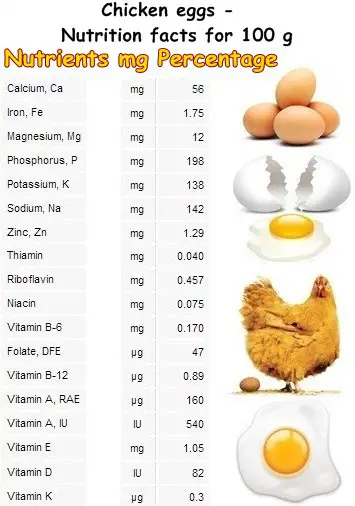Chicken eggs are a rich source of protein, vitamins and dietary minerals and a healthy food choice for people of many ages.
Chicken egg consumption holds numerous health benefits, irrespective of the cooking method employed. It is true, however, that preparing your eggs a certain way can ensure you get the most of their nutrients. While other egg varieties such as duck, goose, quail or turkey hen are also popular in many parts of the world, chicken eggs remain the preferred type, mostly due to their wide availability.
Their greatest health benefit lies in their high content of quality protein, containing all nine essential amino acids as well as five other non-essential amino acids, with a bioavailability of around 90%. In other words, chicken eggs, as well as other types of eggs, are beneficial for our health because they supply us with great amounts of quality protein, vitamins and dietary minerals that support physical health and mental functions.
Find out below what are the most noteworthy 7 health benefits of chicken eggs.

What are the benefits of Chicken Eggs?
1) Great for eye health
Research suggests that eating one egg a day may help prevent cataract and macular degeneration, a condition characterized by the loss of central vision due to old age. This is because chicken eggs (and other types of eggs) are a rich source of lutein and zeaxanthin, two carotenoids that favor eye health and good vision. Carotenoids are generally found in orange foods (fruits, vegetables, spices, eggs) as well as some dark green leafy vegetables (spinach, for example).
Lutein, for example, is found in generous amounts in egg yolks and animal fat (chicken skin). Zeaxanthin can be found in green leafy vegetables (turnip greens, kale, collard greens, spinach), some spices and egg yolk (chickens obtain it from plant sources and pass it onto their eggs).
Both lutein and zeaxanthin gather in the human retina and, from there, exert their antioxidant functions, protecting against free radicals from sunlight and helping preserve eye health.
While taking lutein and zeaxanthin supplements has not been confirmed to prevent macular degeneration or cataract, various studies have observed that people who eat foods rich in carotenoids tend to have a better vision well into old age.
2) Excellent source of high quality protein
As mentioned above, chicken eggs are a rich source of protein, one of three essential macronutrients along with fat and carbohydrates. Proteins are made of amino acids and it is these amino acids that have a positive impact on our health.
Some amino acids are essential, meaning our body cannot produce them because it doesn’t have the enzymes to do so, but requires them for keeping us alive and well, while others are nonessential, meaning we can live without them but we would be a lot healthier if we had them in our diets.

A common misconception is that protein is found in meat sources alone, when, in truth, many vegetables and all egg varieties are quality protein sources. Chicken eggs, in particular, contain all the essential amino acids: histidine, isoleucine, leucine, lysine, methionine, phenylalanine, tryptophan, threonine and valine. It also contains several other non-essential amino acids: alanine, arginine, aspartic acid, cystine, glycine, glutamic acid, proline, serine and tyrosine.
For this reason, eggs in general are viewed as a source of complete protein and wholeheartedly recommended for consumption.
One medium-sized egg contains about 6 g of high quality protein (or 12.6 g/100 g of egg). Proteins from them support cognitive development in children, promote good immunity, ensure muscle health, reduce the risk for brain-related disorders such as anxiety, nervousness or fatigue, promote good energy levels and contribute to strong, beautiful hair and nails and healthy, radiant skin, promote tissue repair and reduce healing time, positively affect blood pressure, etc.
3) Excellent source of choline
It is estimated that one egg yolk contains about 300 micrograms of choline, an important brain nutrient. The daily recommended intake for adults ranges from of 400-550 micrograms. Choline is a type of B-complex vitamin, soluble in water.
The nutrient has been found to be essential for proper brain development, liver health, prevention of neural tube defects in newborns, kidney problems, etc. Eating one egg a day and including plant sources of choline in our diet (cauliflower, broccoli, spinach, quinoa, almonds or brown rice) can supply us with the necessary intake.

4) Provides moderate amounts of fat
A medium-size egg (around 50-60 g) contains about 5 g of fat which is stored mostly in the yolk (100 g of chicken egg has about 10 g of fat). Only about 30% of this fat is saturated (not-so-healthy) fat, which means eating chicken eggs on a regular basis will have no negative impact on our health.
Eggs are as natural as food gets. Eating them is beneficial for us because our body needs the nutrients in them and even makes use of the small amounts of saturated fat they contain.
How is this good? Well, research shows that saturated fats increase total cholesterol levels. But total cholesterol implies both LDL (bad) and HDL (good) cholesterol. This means that the little amounts of saturated fat we get from eggs can help boost our healthy fats levels, contributing in reality to good cardiovascular health.
The trick is to avoid processed foods high in saturated fats and have an overall balanced diet consisting of large amounts of fresh fruit and vegetables and small to moderate amounts of animal products (not processed).
5) Eggs do not cause cardiovascular disease
Chicken eggs and eggs in general are known to contain cholesterol (884 mg/100 g or about 442 mg/medium-sized egg). Cholesterol is actually a molecule found in animal and human cells and is essential for our cell’s ability to live, move and change shape.
Our body produces its own cholesterol and when our dietary intake is too high, it reduces its production to maintain a certain balance. Even plants produce a form of cholesterol called phytosterol that our body uses to perform some of the same functions of cholesterol.
In other words, we actually do need to consume cholesterol, be it from plant or animal sources, in order to stay alive and healthy, just in small amounts. As long as we eat a healthy diet, enjoying a few chicken eggs every week is actually good for us because the eggs provide us with nutrients we need to keep in good health, including fat and cholesterol.
Only when we eat too much can a certain food or beverage be bad for our health. Ever wondered how many eggs should you eat a week?
6) Good source of vitamin D and phosphorus
Chicken eggs are one of the few foods that contain vitamin D, alongside dairy products, mushrooms and a few others. Vitamin D is essential for bone and teeth health as well as good immunity. Some studies even suggest that vitamin D deficiency can increase the risk for certain cancers. Also, eggs are a good source of phosphorus, a dietary mineral that also contributes to strong, healthy bones, good digestion and hormonal balance.
7) Strong hair and nails and beautiful skin
Certain amino acids found in chicken eggs help strengthen hair and nails and improve their appearance. Also, the fat content and vitamins in them ensure beautiful, radiant skin. Other vitamins and minerals in chicken eggs include vitamin A and B vitamins, calcium, iron, magnesium, potassium, sodium and zinc.
Considerations
Overall, chicken eggs are a healthy option. If you have some open space around the house and a patch of grass, I encourage you to get yourself a few chickens (any breed you like) and enjoy some organic eggs.
The sight of those little birds plucking away grass in your yard is sure to de-stress you as well. And whether your chickens lay white or dark colored eggs (brown, with speckles, greenish and so on), it doesn’t really matter as they are all just as healthy as long as you provide quality feed and also let the birds eat grass.
The way we cook eggs matters as well. Hard boiled eggs are a healthy option not only because boiling destroys any potential pathogen (Salmonella in particular), but also because it helps solidify the proteins in the yolk and white which makes them highly bioavailable (very easy to absorb). It is a known fact that our body absorbs up to 90% of all the protein in cooked eggs, while eating uncooked eggs can actually inhibit absorption.
Soft-boiled eggs or poached eggs are also a healthy option because the yolk remains fluid.
A fluid yolk is soft and easy on the stomach and the nutrients in it easy to absorb, meaning our body has a better chance of absorbing the healthy compounds in the egg such as lutein, zeaxanthin, vitamins, etc. Also, feeding chicken marigold petals, alfalfa or corn (not genetically modified) gives the yolk a more intense color as a result of higher amounts of lutein and zeaxanthin accumulating in the egg. Despite the whole propaganda against them, eggs are a nutritious option.
